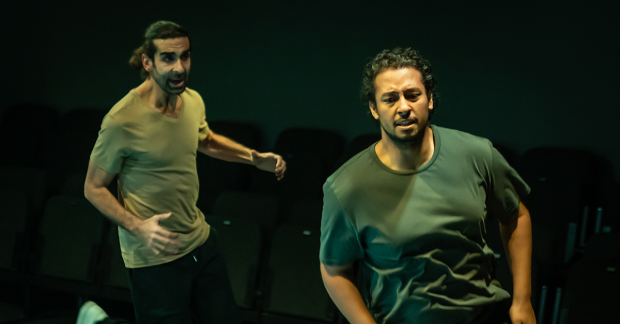
© Marc Brenner
Bijan Sheibani writes his debut play like a poker professional reveals their winning hand. Every card, every plot point, is neatly unveiled with assured timing and precision, culminating in a gripping, harrowing exploration of family, relationships and what happens when the past collides with the present.
As an artist responsible for directing some of the biggest productions of the last decade – The Brothers Size, A Taste of Honey, Barber Shop Chronicles to name three – it might be a daunting prospect to whip out the writer's pen and have a stab at crafting your own text. But Sheibani's writing doesn't come with a single shade of green – every line is tailor-made, hitting with emotional depth as knots twist and tangle to form a thorny whole.
The pacy 70 minutes follow two brothers – Tom and Samad – reconnecting after decades apart. Tom, given up for adoption by his parents, has to imagine the life Samad takes for granted. Samad, confronted by a leaner, sportier, more put-together counterpart, has to wrestle (quite literally at times) with the idea of not being the eldest sibling. The years have divided them culturally, socially – Samad is enrolled in a private school, Tom 'the school at the end of the road'. Tom tackles iron man marathons while Samad is terrified of tearing tendons.
Set on Samal Blak's blank revolving set, Sheibani pits the pair against each other – almost always facing inwards, eye-to-eye. It's part petri-dish and part fighting pit. In hazy, half-lit interludes the two dance, mimic, battle and chase one another. Prowling and pacing through scenes set months apart, they grow closer before blasting wider apart, like two positively charged magnets thrust into close proximity.
Scott Karim and Irfan Shamji are perfect foils for one another, Shamji peppering his performance with small, furtive glances, fearing and pitying his elder brother and the raft of questions he brings with him. Karim, for his part, brings both a long-suppressed hurt and a hurtfully-suppressed longing to Tom, eager to impress his birth family yet knowing that to intrude is to overstep some line laid down when he was weeks old.
If anything it can sometimes feel too clinical, not accommodating the messy, awfully paradoxical nature of human relationships. But in terms of debut plays, they seldom get more assured than this.
















